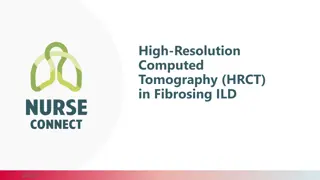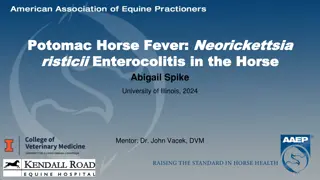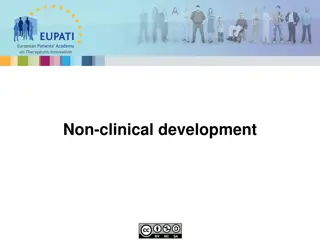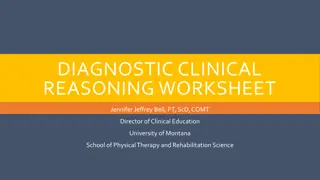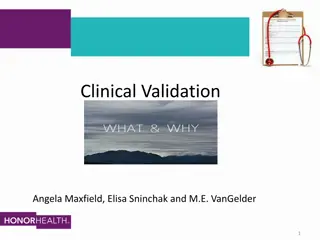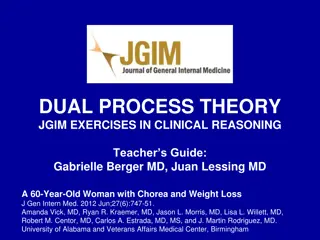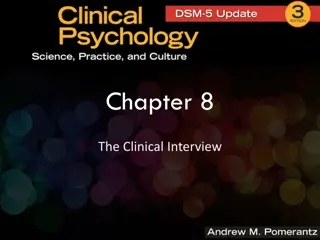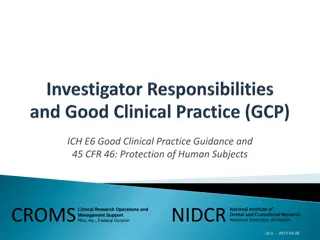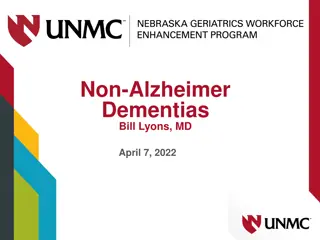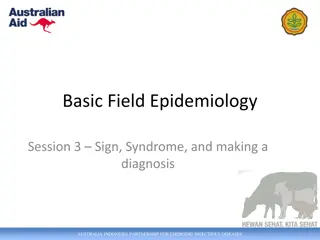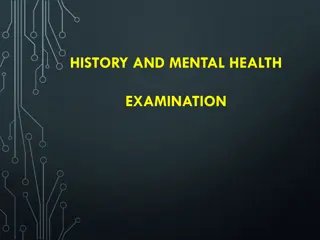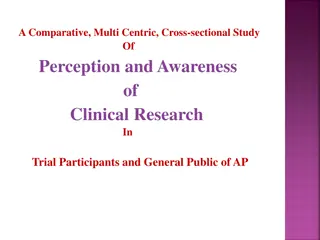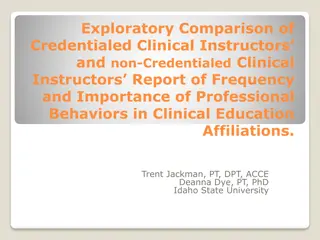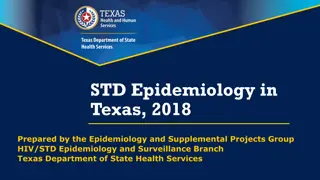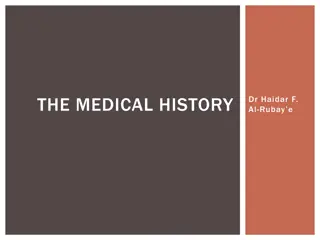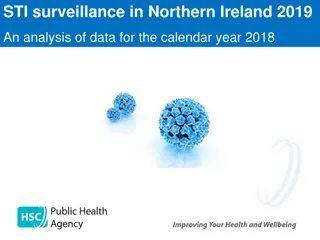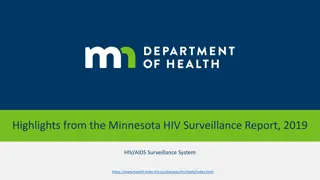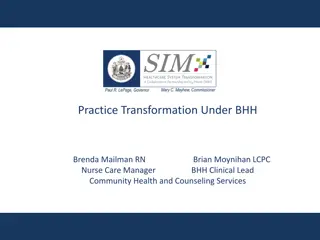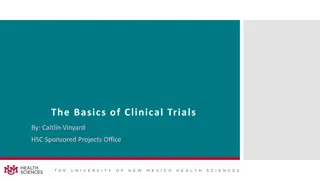Evolution of AI and ML Technologies in US Healthcare Market
Artificial intelligence (AI) and machine learning (ML) technologies are rapidly growing and evolving within the US healthcare market. These tools have the potential to revolutionize healthcare by quickly diagnosing patients, deriving new insights for treatments, monitoring patients, and streamlining
0 views • 18 slides
Role of High-Resolution Computed Tomography in Fibrosing Interstitial Lung Diseases
HRCT plays a crucial role in diagnosing and monitoring fibrosing interstitial lung diseases (ILDs). It helps identify abnormalities not visible on X-rays, leading to early, accurate diagnoses and potentially avoiding invasive procedures. HRCT assists in distinguishing specific ILDs based on radiogra
1 views • 25 slides
Injury Surveillance in Scotland: Importance and Implementation Overview
Scotland's Public Health body, Public Health Scotland, leads efforts in injury surveillance to prolong healthy life, prevent disease, and promote health. Long-term investment in prevention involves various sectors. Injury surveillance is crucial as it helps manage and prevent injuries, with coded da
4 views • 24 slides
India Alliance Clinical & Public Health fellowship in India
India Alliance Clinical & Public Health fellowship in India\n\nIndia Alliance Clinical and Public Health Research Fellowships are for Health researchers with an MD, MS, MPH, or an equivalent clinical or public health degree, who can apply for the DBT\/Wellcome Trust India Alliance Clinical and Publi
0 views • 5 slides
Potomac Horse Fever: Clinical Presentation and Diagnostic Plan
A 5-year-old Quarter Horse gelding presents with symptoms of colic and possible Potomac Horse Fever. Initial physical examination reveals sweating, tachycardia, and abnormal bowel sounds. The differential diagnoses include gastrointestinal infections, viral and bacterial causes. The diagnostic plan
1 views • 15 slides
Ethical Issues in Clinical Pharmacy Research by Dr. Haider Raheem Mohammad
Research ethics play a crucial role in clinical trials and therapeutic research in the field of pharmacy. From discovery to validation, all medicines undergo rigorous evaluation processes to ensure safety, efficacy, and freedom from adverse effects. Clinical trials in both animals and humans are ess
0 views • 20 slides
Advanced Clinical Practice Framework and Pillars of Practice
The document discusses the advanced clinical practice framework and the four pillars of practice which include leadership & management, clinical practice, education, and research. It emphasizes the importance of core capabilities and area-specific competence in advanced clinical practice. The role o
2 views • 8 slides
Objective Structured Clinical Examination (OSCE): A Modern Approach to Assessing Clinical Competence
The Objective Structured Clinical Examination (OSCE) is a modern examination method widely used in the field of health science to evaluate clinical skill performance. It involves stations where medical students interact with simulated patients to demonstrate competencies such as history taking, phys
1 views • 40 slides
NIMH Clinical Research Education and Monitoring Program Overview
NIMH's Clinical Monitoring and Clinical Research Education, Support, and Training Program (CREST) aims to ensure the proper conduct, recording, and reporting of clinical trials. This program includes clinical monitoring plans, guidelines for site monitoring activities, and independent clinical monit
1 views • 29 slides
Understanding Non-Clinical Development in Therapeutic Innovation
The European Patients Academy on Therapeutic Innovation focuses on the non-clinical development phase of medicine, delving into efficacy assessment, safety evaluation, and manufacturing process considerations. Non-clinical studies are essential for decision-making in clinical trials, marketing appli
1 views • 26 slides
Clinical Reasoning Worksheet for Differential Diagnoses
A Diagnostic Clinical Reasoning Worksheet created by Jennifer Jeffrey Bell, PT, ScD, COMT, to guide students through the diagnostic process, enhancing their clinical reasoning skills. The worksheet helps in selecting appropriate diagnoses based on patient demographics, describing patient presentatio
0 views • 9 slides
Polymyalgia and Giant Cell Arteritis Overview
This informative content covers key clinical features, investigations, management, and differential diagnoses of Polymyalgia Rheumatica and Giant Cell Arteritis. It includes details on PMR and GCA guidelines, core clinical features, signs indicating other causes, possible differentials, and recommen
2 views • 25 slides
Understanding Clinical Validation and DRG Validation in Healthcare
Clinical validation ensures that diagnoses documented in a patient's record align with accepted clinical criteria, while DRG validation focuses on matching hospital-coded information with physician descriptions and patient records. Clinical validation involves a review by clinicians to confirm the p
1 views • 39 slides
Understanding ICD-11 and Morbidity Coding Principles
ICD-11 is a classification system that groups entities based on statistical relevance and specificity of codes. Entities without specific codes are assigned to residual codes (Y for specified, Z for unspecified) based on hierarchy. Examples illustrate the differentiation between specified and unspec
0 views • 15 slides
Understanding Evidence-Based Medicine and Clinical Decision-Making
European Patients Academy on Therapeutic Innovation emphasizes the importance of Evidence-Based Medicine (EBM) in providing optimum clinical care. EBM involves systematic review and utilization of clinical research for informed decision-making, benefiting patients in disease management and treatment
7 views • 20 slides
Dual Process Theory in Clinical Reasoning: A Case Study Analysis
Understanding dual process theory in clinical reasoning is crucial for healthcare professionals. This case study delves into the application of System 1 and System 2 thinking in diagnosing a 60-year-old woman presenting with chorea and weight loss. System 1 involves intuitive, quick decision-making
2 views • 24 slides
Clinical Documentation Case Study: Posterior Fossa Syndrome and Mutism in Pediatric Patient
A case study of Kaye, a 3-year-old with a posterior fossa mass and obstructive hydrocephalus, highlights the importance of accurate clinical documentation. CDI queries to the physician clarified the distinction between posterior fossa mutism and syndrome, impacting coding accuracy and patient care o
4 views • 11 slides
Essential Aspects of the Clinical Interview in Psychology
Clinical interviews play a crucial role in the assessment conducted by clinical psychologists, showcasing essential qualities like validity, reliability, and clinical utility. Understanding the importance of feedback and honing general and specific skills as an interviewer are key components in cond
1 views • 17 slides
Clinical Validation in Acute Respiratory Failure Case Study
Clinical validation plays a crucial role in ensuring accurate diagnosis and treatment for patients, particularly in cases like acute respiratory failure. This case study highlights the importance of thorough documentation review, collaboration with healthcare team members, and effective validation q
1 views • 29 slides
Understanding Nursing Diagnoses and Interventions in Healthcare
Exploring the evolution of nursing diagnoses from the 1950s to the present day, this content highlights the importance of accurate diagnostic reasoning in creating effective care plans. It covers the types of nursing diagnoses, problem identification, etiology, and signs/symptoms, emphasizing the si
1 views • 27 slides
Clinical Research Guidelines and Regulations Overview
Clinical research encompasses various guidelines and regulations to ensure the protection of human subjects and the credibility of study results. Key aspects include Good Clinical Practice (GCP) standards, Title 45 of the Code of Federal Regulations (CFR) Part 46, and additional CFR sections for cli
0 views • 46 slides
Understanding Eating Disorders in Children by Dr. Soumi Kundu
Eating disorders in children, such as anorexia nervosa, bulimia nervosa, and binge eating disorder, are complex biopsychosocial disorders characterized by dysfunctional patterns of cognition and weight control behaviors. They result in significant physical, psychological, and social complications. T
0 views • 34 slides
Ohio Clinical Alliance: Transforming Clinical Experiences
The Ohio Clinical Alliance, through collaborative partnerships, aims to enhance clinical preparation for educators. The leadership team comprises various representatives and organizations committed to improving student learning. Their activities include retreats and meetings to ensure effective comm
0 views • 27 slides
Understanding Non-Alzheimer Dementias: Cases and Diagnoses
Explore intriguing clinical cases and differential diagnoses related to non-Alzheimer dementias, including symptoms, evaluations, and potential treatments. From B12 deficiency to vascular dementia, unravel the complexities of cognitive impairments in varied scenarios.
0 views • 28 slides
Understanding Signs, Syndromes, and Diagnoses in Epidemiology Session
Explore the significance of signs of disease, syndromes, and making accurate diagnoses in the context of the Australia-Indonesia Partnership for Emerging Infectious Diseases. Engage in activities to differentiate between signs and syndromes, identify characteristics of healthy and unhealthy animals,
0 views • 18 slides
Understanding the Complex Relationship between ADHD and Addictions
Appreciate the intricate evolution of Attention Deficit Hyperactivity Disorder (ADHD) in relation to addictions. Explore clinically relevant science and care management principles for managing co-occurring ADHD and substance use. ADHD and addictions are clinical diagnoses with no definitive tests, h
0 views • 31 slides
Understanding History and Mental Health Examination
Conducting a thorough history and mental health examination is crucial in assessing individuals' well-being. This process involves collecting data, analyzing information, setting goals, creating care plans, implementing interventions, and evaluating outcomes. Clinical interviews, client assessments,
0 views • 32 slides
Perception and Awareness of Clinical Research in Trial Participants and the Public of Andhra Pradesh
This study focuses on understanding the perception and awareness of clinical research among trial participants and the general public in Andhra Pradesh. It highlights the importance of creating awareness about clinical research, previous study results, public attitudes towards clinical trials, and e
0 views • 24 slides
Clinical Cases Review: Neurological, Toxicological, and Orthopedic Presentations
Explore a collection of intriguing clinical cases including neurological symptoms, toxic ingestion, loss of consciousness, and orthopedic injuries. From CT findings to treatment modalities, delve into differential diagnoses, imaging investigations, risk factors, complications, and management strateg
0 views • 13 slides
Advanced HIV Diagnoses Among Gay and Bisexual Men in Australia: 2007-2016 Study Analysis
This study conducted in Australia from 2007-2016 analyzed advanced HIV diagnoses among gay and bisexual men. The research identified factors like age (30-39, 40-49, 50-59, 60+), exposure type (bisexual, MSM + IDU), and region of birth (South East Asia and North East Asia) as significant contributors
0 views • 6 slides
Clinical Cases and Diagnostic Imaging Analysis in Emergency Medicine
This content delves into multiple clinical cases captured through diagnostic imaging, highlighting the patient presentations, radiological findings, potential diagnoses, and recommended treatments. The cases cover scenarios such as shoulder injuries, chest pain with associated symptoms, hip pain in
0 views • 19 slides
Comparison of Professional Behaviors in Clinical Education
Professional behavior characteristics play a crucial role in enhancing student learning during clinical education. This study examines the differences in reported importance and frequency of professional behaviors between credentialed and non-credentialed clinical instructors. The background outline
0 views • 28 slides
STD Epidemiology in Texas: A Data Analysis from 1992-2018
The report presents data on chlamydia and gonorrhea diagnoses in Texas from 1992 to 2018, highlighting trends in cases, demographics, and incidence rates by county. It also showcases chlamydia diagnoses among women by race/ethnicity during the period 2009-2018. The information sheds light on the epi
0 views • 18 slides
Efficient Medical History Taking Guidelines
Medical history taking is a crucial step in diagnosis, involving the patient's account of illness and relevant information. Following a structured framework helps identify potential diagnoses. Key elements include personal information, chief complaint, presenting illness history, review of systems,
0 views • 51 slides
Enhancing Clinical Academic Collaboration Between Universities and NHS Trusts
Clinical academics play a crucial role in integrating clinical practice, research, and education within the NHS. Collaboration between universities and NHS trusts is key to ensure clinical academics address the right questions for patient care and societal benefit. Challenges include an aging clinic
0 views • 29 slides
STI Surveillance in Northern Ireland 2019: Analysis of Data for Year 2018
This report presents an analysis of sexually transmitted infection (STI) surveillance data in Northern Ireland for the calendar year 2018. It includes trends in diagnoses, sexual health screens, new diagnoses of STIs, chlamydial infection diagnoses, referral sources of specimens, laboratory reports
0 views • 19 slides
Understanding Key Clinical Approaches and Commonly Missed Aspects in Medical Diagnoses
Explore essential clinical approaches in diagnosing acute and chronic problems, along with strategies for effective studying and preparing for uncommon scenarios. Discover commonly missed aspects in familiar approaches and less familiar presentations in various medical conditions.
0 views • 13 slides
Insights from Minnesota HIV Surveillance Report, 2019
Detailed data on HIV diagnoses in Minnesota in 2019, including new diagnoses, disease trends, cases by county, and population breakdown by race/ethnicity and sex assigned at birth. The report also covers rates of HIV diagnoses, risk factors, and provides a snapshot of the HIV/AIDS situation in Minne
0 views • 21 slides
Enhancing Healthcare Outcomes through Behavioral Health Homes (BHH) at CHCS
Learn about the benefits of having a BHH at CHCS, including improved coordination of care, mitigation of medical issues contributing to mental illness, and better identification of client needs. With a team approach, BHH allows for addressing medical diagnoses and reducing unnecessary ER visits. Dis
0 views • 7 slides
Understanding Clinical Trials: Phases, Types, and Definitions
Clinical trials play a crucial role in advancing medical research and treatment options. This comprehensive guide covers the basics of clinical trials, including their definition, phases, types, and key definitions like IND, IDE, NDA, and more. Discover how different phases of trials work, the vario
0 views • 16 slides

